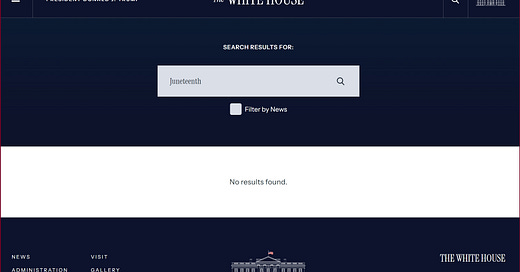Happy Juneteenth – our newest federal holiday. It’s only officially been around since 2021, when President Biden signed legislation making it the United States’ 11th federal holiday. Presidents often release proclamations concerning holidays, with President Trump issuing a Juneteenth proclamation in 2020 – before it was a federal holiday – calling it, “both a remembrance of a blight on our history and a celebration of our Nation’s unsurpassed ability to triumph over darkness”.
It seems that he’s changed his mind about Juneteenth. There was no presidential proclamation today, no Juneteenth events on President Trump’s schedule, and no Juneteenth posts from the official White House X account or Trump’s Truth Social account. When I did a search for ‘Juneteenth’ on the White House website, this is what came back.
A cynical person might conclude that President Trump’s 2020 Juneteenth proclamation was the insincere action of a man running for reelection. Once he won a second term, he could forget about a holiday that many of his most ardent supporters aren’t exactly crazy about. According to a 2023 University of Massachusetts Amherst poll, only 13 percent of Republicans supported Juneteenth being a federal holiday, compared to 32 percent of independents and 69 percent of Democrats. According to the poll, most Republicans don’t even want public schools to teach kids about the significance of Juneteenth – less than 30 percent of Republicans felt that was a good idea, compared to nearly 90 percent of Democrats.
While the United States lags far behind other developed countries in terms of paid vacation time, we’re pretty close when it comes to federal holidays. We currently have 11 of them, just under the OECD average of 12.1.[1] I’d like to see a few more to fill the big gaps between late February (Presidents’ Day) and the end of May (Memorial Day), and from Independence Day until Labor Day.
I’ve got some good candidates (well, I like them anyway). My first new federal holiday is Moon Landing Day, to be celebrated on July 20th, in commemoration of the “can-do” spirit and adventurous nature of Americans. Over half a century after Neil Armstrong stepped out of the Lunar Module Eagle onto the lunar surface, the United States is still the only country to have set foot on the Moon. It was a proud moment for all Americans, and surely deserves commemoration.
My second new federal holiday is Union Day, celebrated on April 9th, the date the Civil War ended with Lee’s surrender to Grant at Appomattox Court House. Some might argue that this overlaps with Juneteenth, but not really – the latter holiday is about the end of slavery, whereas Union Day would celebrate our coming back together as a country after the horrors of the Civil War.
I’ll throw in a third new federal holiday, just because: Election Day. This one would only be every other year, to coincide with federal elections. Most Western democracies have their elections on weekends, and it’s common for those that don’t to declare federal elections holidays. Republicans typically aren’t in favor of this, but if an Election Day holiday were combined with a nationwide federal election voting rule limiting early and absentee voting to two weeks before Election Day, it might stand a slightly better chance.[2]
There is a cost to federal holidays. All non-essential federal workers get them off, with pay, and essential workers typically earn double time for working on federal holidays. It’s tough to come up with an exact estimate, but on average, every federal holiday costs taxpayers somewhere around $1 billion.[3] But when you consider that in terms of the overall federal budget, with projected spending of around $7 trillion this year, it amounts to hardly anything. It would be like the average American household spending around $34 on, I don’t know, sparklers, hot dogs, and beer.
[1] OECD is the Organization for Economic Co-operation and Development – 38 of the world’s most economically developed countries, committed to market-based economies and democratic principles (at least in theory). It’s the closest thing the US has to a peer group and is often used in international comparisons.
[2] Who am I kidding? Any bill that would limit early and absentee voting would surely be opposed by more Democrats than the number of Republicans it would attract.
[3] Though it would be more accurate to US debt holders, since the federal government loves to spend more than it takes in.





I like your suggestions!
After midterms he’ll deep-six Juneteenth, so maybe your Moon Day will be a substitute bone he can throw to any of us Feds who still have a job at that point…